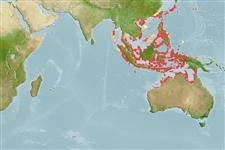>
Ovalentaria/misc (Various families in series Ovalentaria) >
Pomacentridae (Damselfishes) > Pomacentrinae
Etymology: Amphiprion: Greek, amphi = on both sides + Greek, prion, -onos = saw (Ref. 45335).
Environment: milieu / climate zone / depth range / distribution range
Ecologia
marino associati a barriera corallina; non migratori; distribuzione batimetrica 1 - 12 m (Ref. 7247). Tropical; 30°N - 20°S, 91°E - 143°E
Western Pacific: Gulf of Thailand to southwestern Palau, north to southern Japan, south to Java, Indonesia.
Size / Peso / Age
Maturity: Lm ? range ? - ? cm
Max length : 14.0 cm TL maschio/sesso non determinato; (Ref. 9710)
Spine dorsali (totale): 9 - 10; Raggi dorsali molli (totale): 16-18; Spine anali 2; Raggi anali molli: 13 - 15.
Found in lagoon reefs and embayment. Monogamous (Ref. 52884), protandrous hermaphrodite (Ref. 55367). Oviparous, distinct pairing during breeding (Ref. 205). Eggs are demersal and adhere to the substrate (Ref. 205). Males guard and aerate the eggs (Ref. 205). Associated with the anemone Entacmaea quadricolor (Ref. 5911). Has been reared in captivity (Ref. 35413, 35415, 35418, 35420).
Life cycle and mating behavior
Maturità | Riproduzione | Deposizione | Uova | Fecundity | Larve
Benthic spawner. Length at sex change = 6.6 cm TL (Ref. 55367). Oviparous, distinct pairing during breeding (Ref. 205). Eggs are demersal and adhere to the substrate (Ref. 205). Males guard and aerate the eggs (Ref. 205). Monogamous mating is observed as both obligate and social (Ref. 52884). Also Ref. 240, 7471.
Fautin, D.G. and G.R. Allen, 1992. Field guide to anemonefishes and their host sea anemones. Western Australian Museum, Francis Street, Perth. (Ref. 5911)
IUCN Red List Status (Ref. 130435)
Threat to humans
Harmless
Human uses
Acquario: Commerciale
Strumenti
Special reports
Download XML
Fonti Internet
Estimates based on models
Preferred temperature (Ref.
123201): 25.4 - 29.1, mean 28.7 °C (based on 1412 cells).
Phylogenetic diversity index (Ref.
82804): PD
50 = 0.5000 [Uniqueness, from 0.5 = low to 2.0 = high].
Bayesian length-weight: a=0.02344 (0.01149 - 0.04783), b=2.99 (2.82 - 3.16), in cm total length, based on LWR estimates for this (Sub)family-body shape (Ref.
93245).
Trophic level (Ref.
69278): 2.7 ±0.29 se; based on food items.
Resilienza (Ref.
120179): Alto, tempo minimo di raddoppiamento della popolazione meno di 15 mesi (Preliminary K or Fecundity.).
Fishing Vulnerability (Ref.
59153): Low vulnerability (10 of 100).
Nutrients (Ref.
124155): Calcium = 98.6 [50.4, 156.3] mg/100g; Iron = 0.719 [0.433, 1.170] mg/100g; Protein = 18.3 [17.1, 19.4] %; Omega3 = 0.1 [0.1, 0.2] g/100g; Selenium = 20.7 [11.8, 39.1] μg/100g; VitaminA = 82 [23, 267] μg/100g; Zinc = 1.68 [1.14, 2.42] mg/100g (wet weight);
